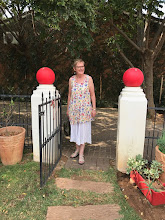
A late afternoon ring at my gate. An unexpected gift. Oliver, the security guard, whose regular beat includes William Drive, stood waiting. He had just returned from a visit to his home village in northern Zimbabwe. Before he left on the three-day bus journey home, I had given him a parcel for his mother. “Mam, my mother was very happy with the parcel you sent her.” He handed me a round, travel stained package. A supermarket bag enclosed a well-used red plastic container. “It’s honey,” he explained, “in the shell. Very, very sweet”. And so it was – honey in a honeycomb. Dark amber. Pungent. Sweet with the distinct flavour of the nectar gathered by a swarm of bees far off in devastated rural Zimbabwe.
“Thank you so much. Wonderful. I love honey.” I answered enthusiastically. Then I hesitated, a little uncertain about the protocol. But it’s my conviction, in a cross-cultural situation, to ask politely for clarity rather than blunder on regardless. “Would you prefer me to pay you for this?”. “No, Mam, it is a gift – for you. Not just because of what you sent my mother. Because of the way you talk to us when you walk with your dogs – the way you interact with us.”
While the comb was draining, I remembered the honeycombs my mother would purchase from roaming pedlars when I was a child living in Camps Bay. Huge fat honeycombs balanced over a chipped white enamel bowl. The sticky sweetness was redolent of the fynbos growing on the slopes of Table Mountain where those bees had gathered their store. A little bit of comb broken off for my brother and me to squash into waxy gold on our toast.
I have decided to bake a honey cake with this honey, this tub of honeycomb passed through the wrought ironwork of my front gate – a precious gift from a poor man.


 as Zan and Minnaar did on Saturday.
as Zan and Minnaar did on Saturday.


















 See that special glow?
See that special glow?
